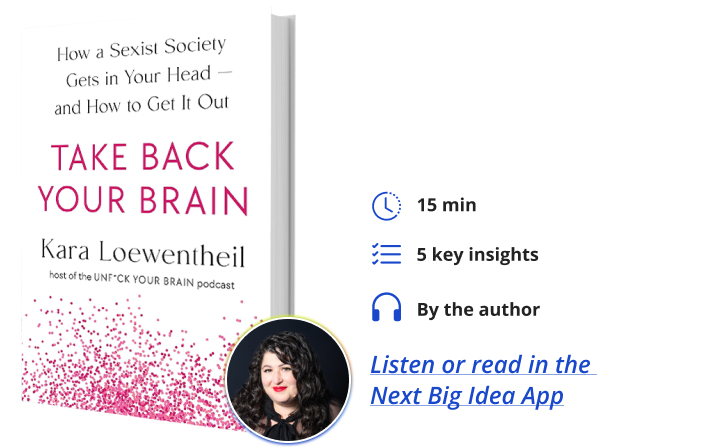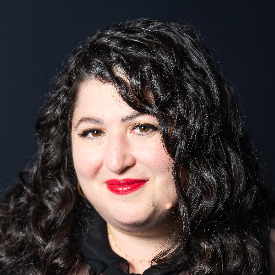Kara Loewentheil started her career as a reproductive rights litigator and academic before pivoting to becoming a life coach. She is currently the host of the internationally top-ranked UnF*ck Your Brain podcast, the founder of the School of New Feminist Thought, and a coach, speaker, and author focusing particularly on women’s self-conception and self-image.
Below, Kara shares five key insights from her new book, Take Back Your Brain: How a Sexist Society Gets in Your Head–and How to Get It Out. Listen to the audio version—read by Kara herself—in the Next Big Idea App.

1. Intersectional socialization massively impacts the way your brain works.
In broad strokes, psychotherapy has traditionally focused on the role of family of origin as it affects our psychology. Coaching has traditionally focused on evolutionary psychology and biology to help us hack our brains. However, there is a third big contributor to what makes up our mental landscape: socialization.
We are born with instincts but not much else. We learn everything else from watching the world around us. This includes everything from what foods are safe to eat raw or cooked, to whether pants go on your arms or legs, to who is considered worthy of respect, and how different kinds of people are valued by society. Sometimes, it’s explicit—there was a study that showed girls are more often praised for doing something perfectly while boys are praised for effort and allowed to make messes. Sometimes, it’s implicit—no one says a word about your unmarried uncle with a successful career, but your unmarried aunt, who is equally successful, is always being asked if she’s dating.
Women grow up with a lot of this programming deep in their brains: That women should always be nice and kind and helpful. That girls need to be pretty and sexually appealing but not too sexual. That men are better at money and math. That men’s sports matter and women’s don’t. That women need to be in service to other people at all times, or they are selfish. That women are naturally destined to be mothers. The list goes on and on.
Anyone socialized as a woman absorbs this conditioning long before their romantic or sexual orientations manifest. Anyone of any gender absorbs messaging about the gender with which they identify. This socialization is also intersectional, meaning people absorb different messages based on their identities.
As a Jewish woman, I hear messages about what Jews are like, what women are like, and what Jewish women are like—some positive messages, some negative messages. A Black woman hears messages about not only what women are like but what Black people are like and what Black women specifically are like. Whatever identities you have, you have absorbed messages from society that tell you about who you are, and those messages sink into your subconscious.
2. The Brain Gap.
The Brain Gap is the gap between what women want to think and feel and how they actually think and feel. This happens because social programming does not identify itself as programming in our minds. Instead, it shapes our self-conception in invisible ways, and we assume that our thoughts about ourselves are true.
“Social programming does not identify itself as programming in our minds.”
For instance, I grew up observing that no matter what a woman has accomplished in her life, people think it is sad if she’s not married and doesn’t have kids. As a teen, I discovered feminism. So now I didn’t want to believe that. I wanted to believe my adult conscious thoughts about how women can choose any life they want and that marital status doesn’t define them. Meanwhile, I was always fixated on whether or not I was being ghosted by the guy du jour I met on Tinder whose last name I didn’t even know. I still felt insecure about being single and couldn’t help but feel like the people around me were judging me or pitying me for not being married. Why? Because of the Brain Gap between those two thought patterns.
Brain Gaps show up in every area of women’s lives. You want to believe that being a mom doesn’t have to be your whole identity and that you deserve a well-rounded life as a parent, but you feel guilty anytime you prioritize yourself over your kids. You know you’ve accomplished a lot in your career and should feel confident, but you still feel like someone will figure out that you don’t know what you’re doing any minute. The list goes on and on. These are all Brain Gaps created by how women are socialized to think about women in general, which they internalize into thoughts about themselves.
3. These gaps don’t stay inside our brains.
Brain Gaps impact how we feel and act, and the returns we get from those actions impact the world. We end up acting out internalized oppression without even realizing it. Cognitive behavioral psychology teaches us that thoughts create emotions, which create behaviors. This is an overly simplified model in some ways, but it is useful for seeing the big-picture pattern.
Our behaviors (actions and inactions) impact the outcomes in our lives. I call this cause and effect the return we get on the investment of mental and emotional energy in our thoughts, feelings, and behaviors.
For instance, if, like some of my clients, you have grown up hearing that women are natural mothers, that we are naturally more nurturing, and that women want to take care of babies, you will believe that you should feel all those things. Then, you may have a kid and find an unequal division of caretaking in your household. As a feminist, you may want to remedy that, but you’re fighting the subconscious thoughts that make you feel guilty if you do anything other than take care of your baby or make you think your male partner will resent you if you ask him to take care of the baby—or even if you take him up on it when he offers.
4. Awareness of Brain Gaps will not change these thought patterns and behaviors.
You have to rewire your brain bit by bit to change the way you think. Positive thinking/affirmations work for some people but backfire for many and make them feel worse. The key to sustainable thought change is to use the thought ladder: start with a thought that just feels a little less bad and work your way up. I call this the ten percent less shitty thought, and it’s the secret to life. This method is how you find a thought you can believe now that’s just a little bit better than your current thought. You get some emotional payoff from practicing it, which makes your brain willing to keep doing it. Over time you can build up to whatever thoughts you want to have, and the truth is your current brain usually can’t even imagine how good those thoughts can get yet.
“The key to sustainable thought change is to use the thought ladder: start with a thought that just feels a little less bad and work your way up.”
I have changed everything in my life using this method. I went from binging and purging with a terrible body image to a healthy relationship with my body. From never working out to lifting two times a week with a trainer. From settling and dead-end relationships to being engaged to a true partner in all senses. From believing I was bad with money and an imposter at every job I had to creating a seven-figure coaching business and creating a podcast with 50 million downloads. From believing I would never have ideas of my own to creating an entirely new theory of coaching and landing a major book deal to share with the world. From always underplaying myself to being able to own my accomplishments proudly.
It’s not because I’m special. It’s because I know how to identify the ways that socialization has engrained gendered limiting beliefs in my brain and how to change them. If you’re socialized as a man, the messages might be different, but they are holding you back in their own ways all the same: from talking about your emotions, being able to feel vulnerable, accessing your true desires, and showing up for a more equal world. Whatever your gender (or any other identity) the way society has taught you to think about people like you is impacting the way you think, feel, and behave. It’s impacting the outcomes in your life and the world.
5. Liberating ourselves has to start inside our own minds.
The feminist movement (or any movement) has historically focused exclusively on structural changes, policy, politics, and law. Those are important efforts. There absolutely are external structures that create inequality in society. My whole framework is based on that being true, but we do not pay enough attention to how they influence our brains, not just our circumstances.
We need to address the way that women think and feel about themselves based on the gendered beliefs that society has taught them. When we internalize oppressive belief systems and use them against ourselves, we perpetuate those systems. That doesn’t make them our fault, but we do have the power to change them. Our minds are the fastest and most powerful place we can intervene, which will make our own lives feel better but will also help us impact the world.
Anyone who has ever changed the world has been able to do so because they did not believe what society was telling them. They believed the world could be different. Suffragists and their allies didn’t accept society’s teaching that they were too stupid or frivolous to be allowed to vote. Enslaved people and their allies didn’t accept society’s teaching that they were inferior and that their suffering didn’t matter. If you don’t trust your own ideas and discernment, if you don’t trust yourself when you think something different than what society told you, how will you ever make change happen?
Social change comes from people who think differently than the norm. If we want to change society, we must first change how we think about ourselves. To make the outside world better, we have to dive inside first.
To listen to the audio version read by author Kara Loewentheil, download the Next Big Idea App today:
































